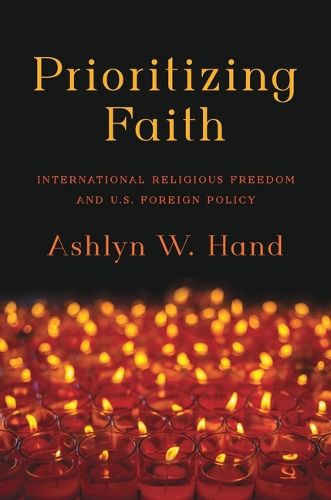Readings Newsletter
Become a Readings Member to make your shopping experience even easier.
Sign in or sign up for free!
You’re not far away from qualifying for FREE standard shipping within Australia
You’ve qualified for FREE standard shipping within Australia
The cart is loading…






Uncovers the political, ideological, and bureaucratic forces that shaped the International Religious Freedom Act of 1998 and its legacy across the Clinton, Bush, and Obama administrations The International Religious Freedom Act of 1998 formally established the promotion of religious freedom as a U.S. foreign policy and national security priority. Tracing its origins and passage, Prioritizing Faith shows how the legislation was made possible by the convergence of growing evangelical and Jewish advocacy, the expanding international human rights movement, and a broader search for post-Cold War purpose. Yet implementation across administrations has been uneven, shaped by shifting geopolitical dynamics and internal institutional constraints. Relying on expert interviews and rich archival analysis, Ashlyn W. Hand traces how Clinton, Bush, and Obama each wove international religious freedom into their foreign policy visions while navigating competing priorities and evolving strategic interests. Through case studies in China, Vietnam, and Saudi Arabia, Hand reveals the inner workings and persistent challenges of American religious freedom policy on the global stage. Timely, insightful, and deeply researched, Prioritizing Faith offers an incisive assessment of the United States' efforts to promote religious freedom abroad, highlighting the enduring tensions between normative aspirations and the complexities of foreign policy practice.
$9.00 standard shipping within Australia
FREE standard shipping within Australia for orders over $100.00
Express & International shipping calculated at checkout
Stock availability can be subject to change without notice. We recommend calling the shop or contacting our online team to check availability of low stock items. Please see our Shopping Online page for more details.
Uncovers the political, ideological, and bureaucratic forces that shaped the International Religious Freedom Act of 1998 and its legacy across the Clinton, Bush, and Obama administrations The International Religious Freedom Act of 1998 formally established the promotion of religious freedom as a U.S. foreign policy and national security priority. Tracing its origins and passage, Prioritizing Faith shows how the legislation was made possible by the convergence of growing evangelical and Jewish advocacy, the expanding international human rights movement, and a broader search for post-Cold War purpose. Yet implementation across administrations has been uneven, shaped by shifting geopolitical dynamics and internal institutional constraints. Relying on expert interviews and rich archival analysis, Ashlyn W. Hand traces how Clinton, Bush, and Obama each wove international religious freedom into their foreign policy visions while navigating competing priorities and evolving strategic interests. Through case studies in China, Vietnam, and Saudi Arabia, Hand reveals the inner workings and persistent challenges of American religious freedom policy on the global stage. Timely, insightful, and deeply researched, Prioritizing Faith offers an incisive assessment of the United States' efforts to promote religious freedom abroad, highlighting the enduring tensions between normative aspirations and the complexities of foreign policy practice.